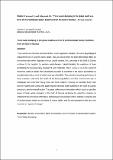Files in this item
Toxic waste dumping in the Global South as a form of environmental racism : evidence from the Gulf of Guinea
Item metadata
| dc.contributor.author | Okafor-Yarwood, Ife | |
| dc.contributor.author | Adewumi, Ibukun Jacob | |
| dc.date.accessioned | 2022-04-13T23:48:26Z | |
| dc.date.available | 2022-04-13T23:48:26Z | |
| dc.date.issued | 2020-10-14 | |
| dc.identifier | 270909743 | |
| dc.identifier | 8dc531c6-ce60-4f9c-83b6-941acbf52e02 | |
| dc.identifier | 85092630174 | |
| dc.identifier | 000578299500001 | |
| dc.identifier.citation | Okafor-Yarwood , I & Adewumi , I J 2020 , ' Toxic waste dumping in the Global South as a form of environmental racism : evidence from the Gulf of Guinea ' , African Studies , vol. Latest Articles . https://doi.org/10.1080/00020184.2020.1827947 | en |
| dc.identifier.issn | 0002-0184 | |
| dc.identifier.other | ORCID: /0000-0003-4952-9979/work/82788924 | |
| dc.identifier.uri | https://hdl.handle.net/10023/25184 | |
| dc.description.abstract | Toxic waste is chemical compounds that, when ingested or inhaled, can cause physiological impairment and, in extreme cases, death. It is also known for its detrimental effect on the environment when disposed of in an unsafe manner. Yet, countries in the Gulf of Guinea continue to be targeted by Western waste-brokers notwithstanding the existence of laws prohibiting the transboundary disposal of such materials. There is also a rise in the export of electronic waste (e-waste) from developed countries to countries in the region, purportedly as reusable electronics, much of which ends up in landfills. The primitive recycling techniques of this e-waste undermines the health of the local populations and their environment due to inadequate care of the heavy metal and toxin content. Drawing on examples from Côte d’Ivoire, Nigeria and Ghana, this paper argues that toxic waste dumping in the Gulf of Guinea amounts to environmental racism. The article makes recommendations relating to the challenges of toxic waste dumping in the Gulf of Guinea, including the need for countries to implement the provisions of the Basel and Bamako conventions in their entirety, recognise acts of environmental racism as violations of human rights, and for young people to rise to the occasion as ‘agents of change’. | |
| dc.format.extent | 597473 | |
| dc.language.iso | eng | |
| dc.relation.ispartof | African Studies | en |
| dc.subject | Bamako convention | en |
| dc.subject | Basel convention | en |
| dc.subject | Africa | en |
| dc.subject | Environmental justice | en |
| dc.subject | E-waste | en |
| dc.subject | G Geography (General) | en |
| dc.subject | JZ International relations | en |
| dc.subject | T-NDAS | en |
| dc.subject | SDG 3 - Good Health and Well-being | en |
| dc.subject.lcc | G1 | en |
| dc.subject.lcc | JZ | en |
| dc.title | Toxic waste dumping in the Global South as a form of environmental racism : evidence from the Gulf of Guinea | en |
| dc.type | Journal article | en |
| dc.contributor.institution | University of St Andrews. Geographies of Sustainability, Society, Inequalities and Possibilities | en |
| dc.contributor.institution | University of St Andrews. School of Geography & Sustainable Development | en |
| dc.identifier.doi | https://doi.org/10.1080/00020184.2020.1827947 | |
| dc.description.status | Peer reviewed | en |
| dc.date.embargoedUntil | 2022-04-14 |
This item appears in the following Collection(s)
Items in the St Andrews Research Repository are protected by copyright, with all rights reserved, unless otherwise indicated.

